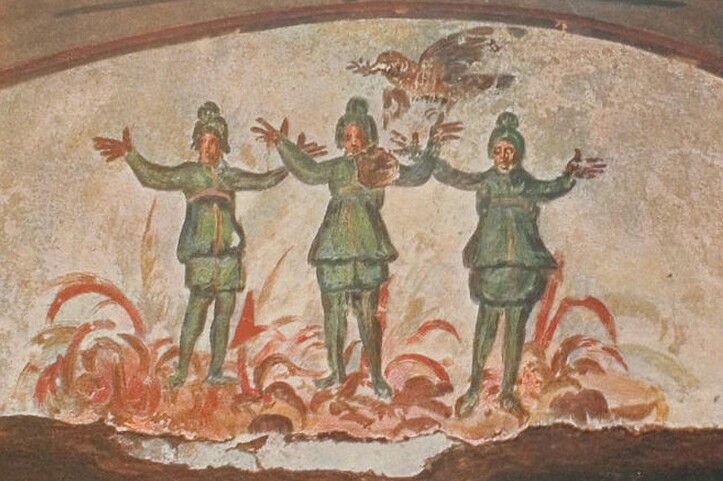Divine Protection: The Fiery Furnace and God's Presence
The story of the fiery furnace, found in the Book of Daniel, is a powerful testament to faith and divine protection. It narrates the experience of three young Hebrew men, Shadrach, Meshach, and Abednego, who faced a life-or-death decision: bow down to a golden idol erected by King Nebuchadnezzar or face the consequences – a fiery furnace heated seven times hotter than normal.
Their unwavering devotion to God led them to choose the furnace over idolatry. This act of defiance sets the stage for a miraculous intervention. As the three are cast into the flames, Nebuchadnezzar is astonished to see not three, but four figures walking within the inferno. He describes the fourth figure as resembling "a son of the gods." This divine presence amidst the flames becomes the central point of the narrative, raising questions about identity and the nature of divine intervention.
This account, deeply embedded in Jewish tradition, serves as a source of inspiration and hope for those facing seemingly insurmountable challenges. The fiery furnace becomes a symbol of trial and tribulation, while the presence of the divine figure highlights the unwavering support and protection offered to those who remain steadfast in their faith.
The historical context of the story places it within the Babylonian exile, a period of profound upheaval for the Jewish people. Forced from their homeland, their faith was tested. The demand to worship the king's idol represented a direct challenge to their monotheistic beliefs. The fiery furnace incident exemplifies the pressures faced by the exiled community and their struggle to maintain their religious identity in a foreign land.
The interpretation of the "son of the gods" varies among different theological perspectives. Some see it as a pre-incarnate appearance of Christ, a manifestation of the divine Logos, emphasizing the continuity between the Old and New Testaments. Others view it as an angel, sent by God to protect his faithful servants. Regardless of the specific interpretation, the figure’s presence underscores the core message of the story: God's power to deliver his people from even the most dire circumstances.
The enduring significance of this narrative lies in its demonstration of unwavering faith in the face of adversity. The story of the fiery furnace offers a powerful message of hope and resilience. It reminds us that even in the midst of our own personal "fiery furnaces," we are not alone.
One crucial lesson is the importance of obedience to God above all else. Shadrach, Meshach, and Abednego exemplify this principle by choosing to honor God’s commands even when faced with a terrifying threat. Their unwavering faith serves as an example for believers across generations.
Another key takeaway is the assurance of God’s presence and protection in times of trial. The appearance of the divine being in the furnace symbolizes God's commitment to those who trust in him. This provides comfort and encouragement to those who face challenges and reminds us that God is always present, even in the darkest of times.
Finally, the story highlights the ultimate victory of faith over adversity. The three men emerge from the furnace unharmed, a testament to God’s power to overcome any obstacle. This miraculous deliverance serves as a powerful reminder that with God, all things are possible.
Advantages and Disadvantages of Interpreting the "Son of God" Figuratively
| Advantages | Disadvantages |
|---|---|
| Allows for a broader understanding of divine intervention. | Can diminish the Christological significance for some. |
| Emphasizes God's power to protect in various ways. | May lead to varying interpretations and potential theological debates. |
Frequently Asked Questions:
1. Who were Shadrach, Meshach, and Abednego? They were three young Hebrew men exiled to Babylon.
2. Why were they thrown into the fiery furnace? They refused to bow down to King Nebuchadnezzar's golden idol.
3. Who was the fourth figure in the furnace? Interpretations vary, often identified as an angel or a pre-incarnate Christ.
4. What happened to the three men in the furnace? They were miraculously unharmed.
5. What is the significance of the fiery furnace? It symbolizes trials and tribulations in life.
6. What is the theological importance of this story? It emphasizes faith, divine protection, and the power of God.
7. How does this story apply to modern life? It reminds us to remain faithful even during difficult times.
8. What lessons can we learn from Shadrach, Meshach, and Abednego? Courage, obedience, and trust in God.
The narrative of the "son of God" in the fiery furnace stands as a timeless testament to the power of faith, courage, and divine protection. It offers a source of inspiration for individuals facing adversity, reminding us that even in the most challenging circumstances, we are not alone. The story's enduring legacy continues to resonate with people of faith, offering solace, guidance, and a profound message of hope. By reflecting on this powerful narrative, we can learn valuable lessons about the importance of remaining steadfast in our beliefs, trusting in God's presence, and embracing the strength that comes from unwavering faith. Let us strive to embody the courage of Shadrach, Meshach, and Abednego, choosing faith over fear and holding onto the belief that even in the midst of the "fiery furnaces" of life, a divine presence walks alongside us.
Harshly criticized crossword clue
Gridiron glory must see nfl showdowns this sunday
Angel stadium seat map your guide to the best views














